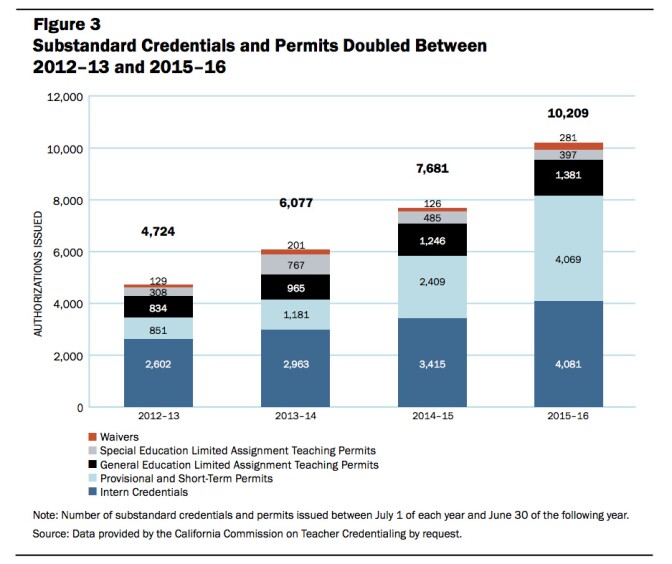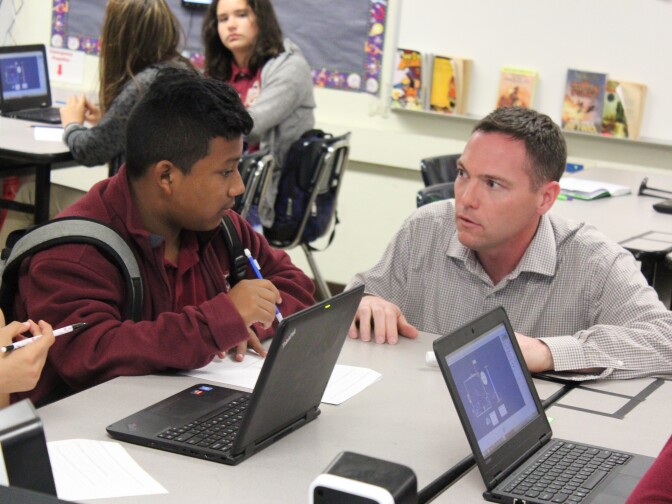This story is free to read because readers choose to support LAist. If you find value in independent local reporting, make a donation to power our newsroom today.
This archival content was originally written for and published on KPCC.org. Keep in mind that links and images may no longer work — and references may be outdated.
Want to teach science or special ed? California may soon have a scholarship for you
California public schools are facing a shortage of teachers — specifically, a shortage of teachers qualified to teach math, science, bilingual or special education.
So state lawmakers are considering making an offer to prospective teachers: commit to teach in these high-need subjects and we'll take a bite out of your tuition costs.
Members of the California Assembly recently approved the creation of a grant program that would offer $20,000 scholarships to prospective teachers who promise to teach science, technology, engineering, math, bilingual education or special education in a public school for four years.
“We need more people getting into teaching," said the bill's author, Assemblyman Patrick O'Donnell (D-Long Beach). "We also need to get the people in the pipeline and out of the pipeline. We need to get them trained in a much more expeditious fashion, and that takes money. It takes money on our side, and it takes money on their side."
O'Donnell's staff said the current state budget draft sets aside $25 million for the proposed "Golden State Teacher Grant Program," enough to fund scholarships for roughly 1,200 prospective teachers.
For comparison, in 2015-16, the state issued around 7,300 teacher credentials in the high-need subjects covered by the bill.
"Is it enough to solve the problem? No." O'Donnell said. "But it is a start."
Demand for qualified teachers in California's public schools is continuing to outstrip the supply of teachers graduating from credentialing programs, according to researchers at the Learning Policy Institute, the Palo Alto-based education policy think tank.
To bridge the supply-demand gap, the state was forced to issue more than 10,000 "substandard" teaching credentials during the 2015-16 school year — more than twice the number issued just four years earlier, the researchers found.

Only one-third of the special education teachers who entered the profession in California in 2015-16 had met all requirements for a full credential — meaning, they'd completed a teacher preparation program and taken a test demonstrating their command of the subject matter they'd be teaching, according to The Learning Policy Institute.
The rest received a substandard credential, indicating they hadn't finished their preparation program or demonstrated subject matter expertise.
Among the substandard credentials, the rise in the number of short-term teaching permits issued has been especially sharp — from 851 in 2012-13 to more than 4,000 in 2015-16. These one-year, "emergency-style" permits allow individuals who haven't demonstrated their qualifications to cover "immediate and acute" staffing shortages.
"When we hand out emergency credentials to people who I'm sure are very dedicated, we're really taking a gamble," O'Donnell said.
The number of fully-credentialed math and science teachers entering the profession also dropped by nearly one-third, the Learning Policy Institute found.
Tara Kini, the Learning Policy Institute's director of state policy, said she's hopeful O'Donnell's bill, AB 169, will "make significant inroads toward solving the teacher shortage."
"There’s a strong evidence base," Kini wrote in a statement, "showing that service scholarships programs like the one proposed in AB 169 … are effective to recruit and retain teachers in high-need fields and communities, especially when the financial incentive is enough to meaningfully offset the cost of preparing to be a teacher."
O'Donnell's bill gives teachers a five-year window in which to complete their four years of service teaching in a "high-need" subject area.
Anyone who receives the scholarship but then drops out of his preparation program, fails to maintain good academic standing or who cannot successfully complete their licensing tests will need to pay the grant back to the state.









